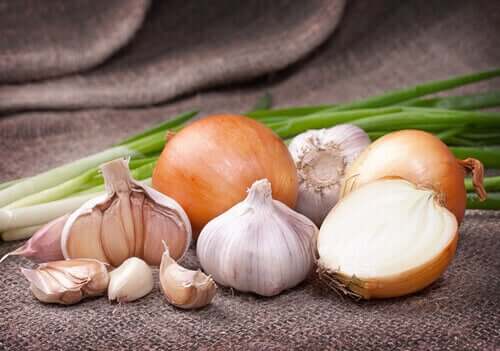Four Remedies to Relieve a Throat Infection

Sore throats are common, which is why many people simply choose to let them go away on their own. If your throat feels dry and you’re unable to swallow, you’re probably suffering from a throat infection.
Today, we’ll explain everything you need to know about this discomfort as well as four remedies that may help you feel better.
Causes of a Throat Infection
A throat infection can be viral or bacterial, meaning it can be caused by either viruses or bacteria.
- Viral: This is the most common one, because it stems from common diseases and the spread of viruses produced by a cold or flu.
- Bacterial: This infection is characterized by pain and inflammation. Strep throat, which is caused by a streptococcal infection, belongs in this group.
Symptoms of a Throat Infection
If you have a bacterial infection, you’re probably suffering from:
- Fever
- Swollen tonsils
- Headache
If your sore throat is viral, though, then you’re probably suffering from:
- Cough
- A cold
- Nasal congestion
- Sore throat
Tips to Relieve Your Discomfort
In general terms, to alleviate the discomfort, you should follow the recommendations below.
Quit smoking

During these days of discomfort, avoid smoking, otherwise your throat will take longer to recover. Tobacco smoke will cause more discomfort and intensify the pain. And in any case, it’s harmful to your health.
Drink More Water than Usual
You should always stay hydrated. Water at room temperature will help relieve your pain.
Dryness worsens the situation. That’s why you the pain is more intense in the mornings, since the throat tends to dry up at night. To keep your throat hydrated, eat hard candies or lozenges to stimulate saliva production.
To soothe a sore throat, keep it moist. “Have you noticed that your sore throat seems to get worse in the morning? That’s because the throat dries out during the night,” says infectious disease expert Valerie Riddle, Ph.D., of the NIH.
See also: Have a Sore Throat? Fight it with These Tips
Eat Dinner at Least Two Hours Before Bed
This way, gastric juices won’t rise up into your esophagus and cause burning and sore throat. Having dinner two hours before bed will ensure the food you ate digests before you go to sleep, which means you’ll run less risk of worsening your discomfort.
Rest
Resting is always beneficial, even in these cases that are considered unimportant. If you rest, you’ll also clear your mind and make better decisions.
This way, you’ll take better care of your throat and your body in general. Resting is very important.
Throat Infection Remedies
Before you resort to antibiotics, it’s important for you to understand that these substances only fight bacteria, not viruses. Thus, if you have a viral throat infection, you shouldn’t take antibiotics.
If you have a bacterial throat infection, your doctor may prescribe antibiotics. The most common type of bacterial throat infection is strep throat, with symptoms of:
- High fever
- Sudden sore throat
- Sneezing
- A cold
- Cough
Taking antibiotics in excess isn’t recommended because you may end up becoming immune to them.
Four Natural Throat Infection Remedies
According to popular wisdom, the following remedies can help to obtain the desired relief and, in addition, complement the treatment that the pharmacist or doctor may have prescribed.
1. Garlic tea

Ingredients
- 3 or 4 garlic cloves
- 2 cups of water (500 ml)
Preparation
- Crush the garlic cloves. Heat the water until it boils.
- Then, add the garlic and cook for 5 minutes.
- Let stand. After that, strain the liquid and drink.
2. Echinacea tea
According to popular belief, this is a plant whose natural properties stimulate your immune system. Furthermore, it’s known to fight respiratory disorders such as influenza or the common cold.
Ingredients
- 2 cups of water (500 ml)
- 2 teaspoons of echinacea flowers (10 g)
- Honey to sweeten (to taste)
Preparation
- First, pour the water into a pot, along with the flowers.
- Then, let the preparation boil over medium heat for 7 minutes and remove from heat.
- Finally, let stand for another 7 minutes before straining and serve.
3. Ginger tea
Ginger is a root which has had multiple uses both in the culinary and medicinal fields. As it has anti-inflammatory and analgesic properties, it could contribute to the relief of discomfort in case of throat infection.
However, it’s important to remember that ginger may be contraindicated in some cases, so it’s important to be well informed before consuming it.
To obtain the maximum benefits, it’s best to use the fresh root.
Ingredients
- 1 cup of water (250 ml)
- 1 teaspoon of grated ginger root (15 g)
Preparation
- Boil the water and then add the ginger.
- Cook for 5 minutes and remove from heat.
- Let stand and then drink.
4. Onion tea

Like garlic, onion is attributed with antibacterial properties. Therefore, it’s said that the consumption of juice or its tea can help relieve throat infection.
Ingredients
- 2 cups of water (500 ml)
- 1 onion
Preparation
- Wash the onion and cut it into julienne strips.
- Add the onion to a pot with water and bring to a boil.
- Remove from heat, let stand for about 7 minutes, and drink.
What if the problem persists?
If these remedies don’t relieve your discomfort, we invite you to consult a specialist so they can prescribe appropriate drugs to fight your throat infection.
All cited sources were thoroughly reviewed by our team to ensure their quality, reliability, currency, and validity. The bibliography of this article was considered reliable and of academic or scientific accuracy.
- Lee, J. Y., & Gao, Y. (2012). Review of the Application of Garlic, Allium sativum, in Aquaculture. Journal of the World Aquaculture Society, 43(4), 447–458. https://doi.org/10.1111/j.1749-7345.2012.00581.x
- Hypotheses, M. (1983). Allium Sativum (GARLIC)- A Natural antibiotic. Medical Hypotheses, 12, 227–237. https://doi.org/10.1016/0306-9877(83)90040-3
- Malhotra, S., & Singh, A. P. (2003). Medicinal properties of ginger (Zingiber officinale Rosc.). Natural Product Radiance, 2(6), 296–301. https://doi.org/ISSN: 2278 – 3008
This text is provided for informational purposes only and does not replace consultation with a professional. If in doubt, consult your specialist.








